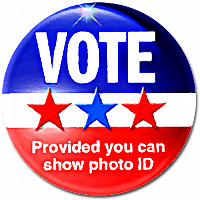 I have been crying “foul” on the voter ID law since it was first proposed in Tennessee. Now, an election law expert in Washington has expressed alarm at the number of states enacting such laws. The Tennessee law took effect July 1 this year.
I have been crying “foul” on the voter ID law since it was first proposed in Tennessee. Now, an election law expert in Washington has expressed alarm at the number of states enacting such laws. The Tennessee law took effect July 1 this year.
In a U.S. Supreme Court challenge to an Indiana voter ID law, 250 cases of alleged voter fraud cited, only nine involved a person allegedly voting under someone else’s name.
Across the country, the situation is essentially the same. Even where there is some evidence of voter fraud, it rarely involved someone voting under an assumed identity. Voter fraud most often involves vote buying, ballot-box stuffing, absentee ballots, or felons voting in situations prohibited by state election laws. Voter ID laws don’t address any of those problems.
As I pointed out previously, the local election commissioner told me that her office is getting better communication from the courts system in providing names of felons who should be removed from voter lists. That system has its own flaws, but the voter ID law won’t help it as Sen. Bill Kitron insists it will.
Across the nation, it is clear that voter ID laws most likely will disenfranchise blacks, Hispanics, senior citizens, persons with disabilities, and the poor. Blacks faced poll taxes before in our history, especially in the south. The poor also were most likely impacted by poll taxes and voter competency tests early in the last century. Senior citizens generally have the highest percentage of voters of any age group.

Guys like Bill Kitron and his comrade Jim Tracy are convinced that anyone of Hispanic descent is an illegal alien. As Tracy said in his single-plank campaign platform, “If we don’t stop them, they will just keep coming.”
Voting is a right that shouldn’t be unnecessarily encumbered. When it is, there usually is a reason behind the hurdle that has noting to do with the voter’s eligibility.


